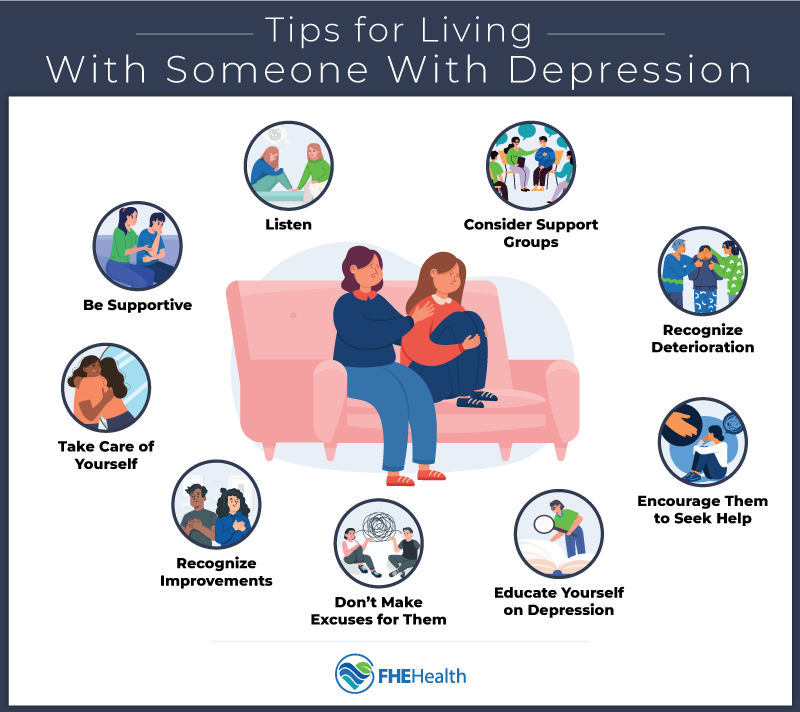
All relationships require a lot of work because they demand time, communication, honesty, loyalty, understanding and compromise. Living or being with someone who’s depressed can be even more challenging, as they may not understand why they’re feeling down. It takes adjustments on your part to provide support while taking care of your own emotional well-being. Keep reading to learn more about living with someone who’s depressed and how you can help.
Understanding Depression
Depression can manifest itself in many ways, which makes it difficult to recognize in others. Everyone experiences dark times when they feel sad and empty, but depression often goes beyond that. Depression is a mental illness that affects all aspects of life and can be debilitating. It’s important to recognize the signs of depression and adopt strategies to help you and your loved one cope.
Signs of Depression
- Constant feelings of sadness
- Expressing feelings of guilt or worthlessness
- Lack of interest in activities and things that once brought joy
- Changes in eating habits
- Weight loss or gain
- Changes in sleeping patterns
- Missed days of work or school
- Suicidal thoughts or tendencies
- Substance abuse

Being With Someone Who Is Depressed
It’s always best to seek professional help when faced with depression. Aside from medical assistance, consider the following tips for living with someone with depression.
1. Educate Yourself
Learn what depression is and how it affects a person’s overall quality of life. Depression is a complex and chronic disorder that affects all aspects of life, including how an individual works with and relates to others. If you live with someone with depression, you need to understand that many of their reactions are because of their disease and not a direct reflection of how they feel about you.
Do a little research. Understand who gets depression and why. In some cases, depression may be a sign of something more serious, including a medical illness, such as cancer or heart disease, or a mental disorder, such as bipolar disorder or schizophrenia. Other risk factors include a family history of depression or trauma and neglect earlier in life. It’s difficult when someone you love lashes out in anger or with negativity, but learning what depression is can help you understand that it’s not you but the challenges they’re dealing with on their own.
2. Foster Open Communication
Provide a safe space for the individual to talk about their feelings without judgment. Studies have shown that talk therapy provides a wide range of benefits, and you don’t have to be a therapist or a professional to listen to someone talk about their problems. Open communication builds stronger relationships, makes the other person feel less lonely and provides relief in difficult situations. Talking about feelings and situations also helps boosts confidence and helps create solutions to problems, and it provides a deeper understanding of what the other person is going through.
3. Provide Support
Providing support when someone with depression pushes you away can be difficult, but it’s important to remain strong through the process so they know they have someone to turn to. To give support, try providing positive reinforcement. Point out the person’s positive qualities and let them know how much they mean to you. Offer help in any way possible. Make suggestions on tasks you can perform to help reduce stress. Be sure to schedule time together, including going on a walk, seeing a movie, having a movie night at home, enjoying a cup of coffee or exercising together. Also, help establish a household routine. Make a schedule for meals and household chores to provide structure and reduce stress. Knowing how to get a depressed person out of bed can be challenging, but mental support is one of the best ways.
4. Encourage Professional Help
When depression is recurring or lasts for more than a couple of weeks, encourage your loved one to seek professional help. Psychologists and psychiatrists are mental health professionals who can provide medical advice and assistance for mental illness. A family doctor or a local social worker can also be a valuable resource to someone struggling with depression. Provide the individual with referrals or help research top mental health professionals in your area.
Approximately 30% of Americans have struggled with depression at some point in their lives, and only 14% received treatment despite the success rates. Treatment options include psychotherapy, medication and brain stimulation therapy. Holistic medicine is another option. It includes massage, hypnosis and acupuncture. At FHE Health, we provide support and therapy for mental health conditions and addiction. We also offer a database of mental health topics to provide solutions to questions about depression and supporting someone with mental illness.
5. Practice Self-Care
Being with someone who’s depressed can put a strain on your own health and emotional well-being. At times, it can even leave you feeling depressed and questioning your own self-worth. Don’t forget to take time for yourself. Take time each day to focus on your own hobbies and interests, and schedule time during the week to devote to something you love. Take time to be alone to rest, relax and recuperate, including reading a book or sleeping late. It also helps to check in with other family and friends to relax and have fun or enjoy a simple phone call with someone you care about. By taking care of yourself, you’ll be in a much better position to provide support.
Professional support is available for your loved ones or friends who are struggling with mental illness. Inpatient and outpatient care are available depending on the severity of the condition. Assistance is also available for those with a dual diagnosis. Learn more about the services provided by FHE Heath by contacting one of our caring counselors 24/7. We can answer any questions you have regarding treatment and put you on the path to recovery.






